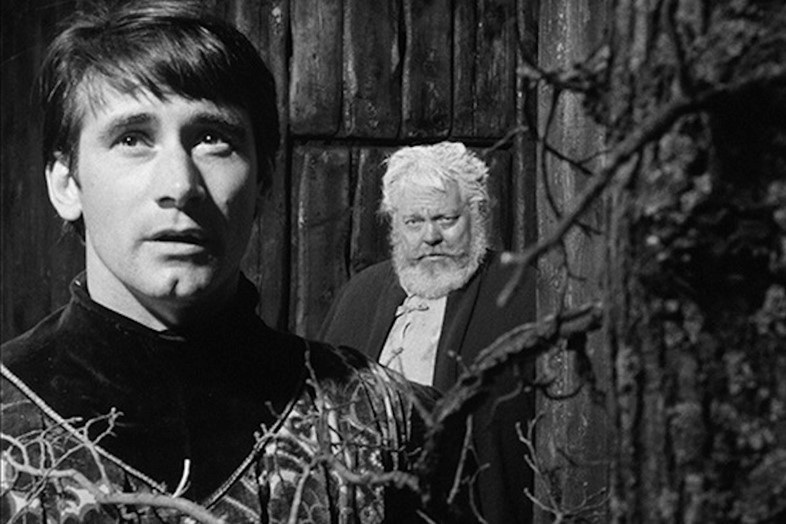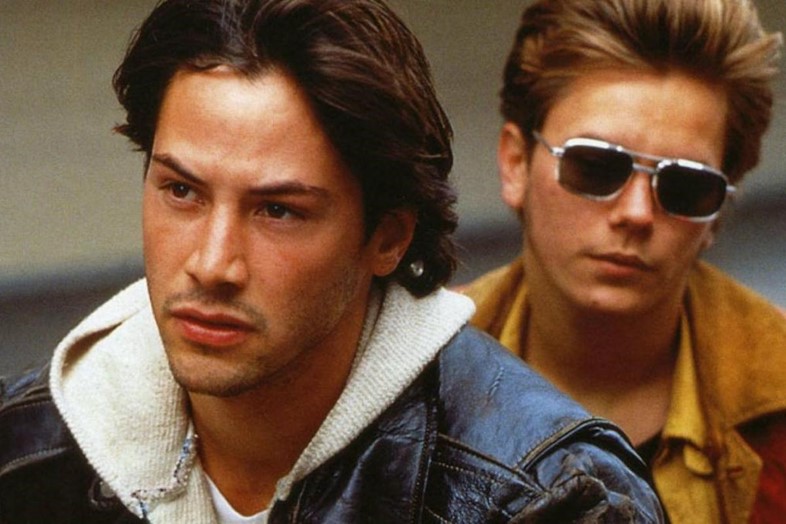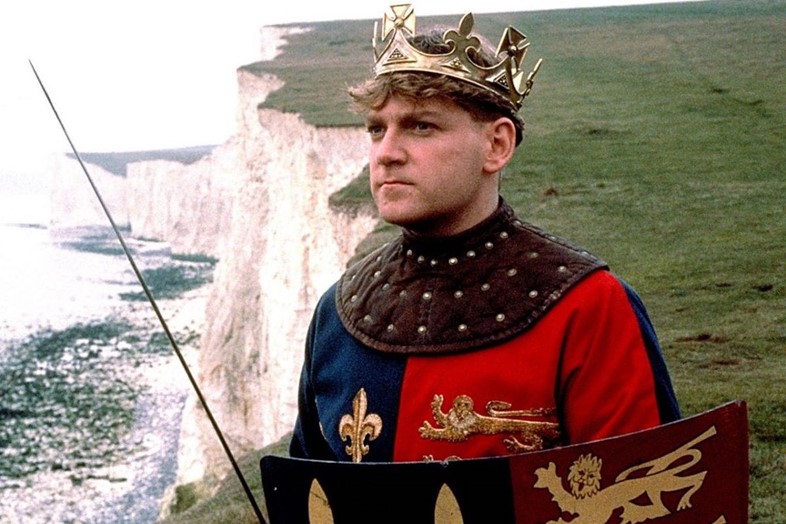Like Sparknotes for fans of Timothée Chalamet and vintage Keanu
The King – a kind of filmic fusion of the plots of Shakespeare’s Henry IV, Part 1, Henry IV, Part 2, and Henry V – is out in cinemas today, ahead of a November Netflix release. The film brings audiences their first taste of period piece Timothée: this December, he’ll also take on the beloved Laurie in Greta Gerwig’s Little Women, a role that has already started whispers of an Academy Award nomination for his windblown hair.
Your forthcoming decision of whether to add The King to your Netflix watchlist is likely going to hinge on your levels of Timothée fandom, rather than a niche article rating the actor’s performance against other ‘Prince Hals’ of history. For stans, there’s even a scene with his real-life girlfriend Lily Rose Depp as a French princess, wearing a large 15th-century bonnet and proffering withering putdowns. Ultimately, David Michôd’s film transplants the plot of Shakespeare’s history plays, removes the soliloquies, adds more bloodshed, trades actual French people for some impressively dodgy accents (sorry, Robert Pattinson), changes the plot in significant ways, and ends up being quite fun. But no matter in what ‘regard’ you view that exercise, you might as well make an informed decision.
The King, 2019
The King focuses on Hal (Timotheé) and his journey from wayward youth to King Henry of England. So far, so Shakespearean. Centred by an admittedly charismatic performance from Timotheé, where The King lands feels like somewhere between 15th-century England, Westeros (Prince Tommen even makes an appearance as Hal’s younger brother), and a student night in the home counties. For the movie’s first chapter, Timotheé’s Hal sports wild scraggly hair and spends a lot of time in bed. He hangs out with his substitute father figure and drinking buddy Sir John Falstaff (Joel Edgerton), in an inn. When his father, King Henry IV, dies, he resumes his kingly duties, which includes sporting a bowl-cut worthy of your next south London soft-boy romance – the kind that will probably end with said soft boy ghosting you. Eventually, that the troops would follow Timothée’s Hal into battle against France starts to feel just about believable, given how terrible his dad seemed.
What doesn’t wash (like every grimy man in this movie), is Joel Edgerton’s Falstaff. In the plays, his characterisation as a lovable but deeply flawed, essentially selfish human is what makes the relationship with Hal so believable in the first place. Instead, Shakespeare’s “ageing alcoholic knight” is an angel, displaying a supernatural sixth sense for laying down battle plans to save the day, and Hal never turns his back on him at all, as Shakespeare had it. A highlight has to be the Saint Crispin’s day speech, where Timotheé’s battle cry as he prepares his army to fight the French feels rousing in the way the first bars of Arab Strap’s The First Big Weekend do, as opposed to historically accurate. “Make it inpenetrable! Make it yours! Make it Englind! Make it Englind!” he cries, on horseback, making me want to throw a cold lager over my own head.
Bonus points for the movie’s one constant: whether hungover in crumpled bedsheets, or literally during his coronation, Timotheé is objectively topless, for no real reason, for much of the film’s two hours and 20 minutes runtime.
Boozing: 7
Haircuts: 8
Accents: 9 (shoutout to Robert Pattinson’s Petit le Pou impression raising the bar)
Adherence to Original Shakespeare: 2
Performance: 9
Overall rating: 7

Chimes at Midnight, 1965
Hear me out, above the flutes that pervade the soundtrack, if you can. Orson Welles’ Chimes at Midnight is a starkly postmodernist masterpiece, that should have been seen on way more screens then it has (paging Netflix). Welles directs as well as playing Falstaff, rendering the character physically and emotionally vast; it’s a deeply felt, towering performance that unfortunately makes Prince Hal himself pale into the background. He’s played by Keith Baxter, who was primarily a theatre actor; in fact, the Welles adaptation was first seen on stage in 1960, before being transferred to the screen. What his Prince Hal gets right – which is down to Welles’ direction – is the relationship with Falstaff, who he loves and fears, and Hal’s eventual betrayal of his cowardly friend (unlike in The King, the knight is not redeemed; Hal’s old ways are not reconcilable with the new). Chimes at Midnight is grimy, spooky and sad; there are mud-slinging battle scenes, but they’re not a scratch on the delivery and poignancy of the scenes between Hal and Falstaff. “Banish plump Jack, and Banish all the world,” Welles says at one point, referring obliquely to himself. Says Hal, “I do, I will” (heart clench).
Boozing: 8 (suitably bawdy, with a sense of saying things you shouldn’t, after a few)
Haircut: 4 (the same neat short back and sides when he is a wasteman and when he is a king)
Accents: 7
Adherence to Shakespeare: 9
Performance: 4
Overall rating: 6.4

My Own Private Idaho (1991)
Gus Van Sant’s My Own Private Idaho, starring River Phoenix and Keanu Reeves as Mike and Scott, two street hustlers in Portland, Oregon, began life when Van Sant read John Rechy’s 1963 novel, City of Night. Years later, Van Sant decided to “cut up” his existing script – inspired by William Burroughs’ method, and by watching Chimes at Midnight – which recounted the story of Mike, a narcoleptic sex worker looking for his mother, with another script that recounted Scott’s story. For Van Sant, the story of the Henry IV plays were really a street story: telling the Los Angeles Times on the film’s release that he didn’t see the Shakespearean passages as distracting, “rather, they make the point that what happens to these two people has been happening to people for centuries... I wanted to underscore the timelessness of the story Scott and Mike are enmeshed in.”
Scott Favor is Henry IV updated for the early 90s and the New Queer Cinema movement: a hustler who only sleeps with men for money, and who plans to leave it all behind to become ‘king’ of his father’s fortune when he turns 21. Falstaff comes in via Bob Pigeon, a middle-aged mentor who the youths living on the streets look up to. It’s a loose reworking, but a playfully smart one, that retains all the pathos and tragicomedy of Hal’s journey: there is something actually Shakespearean in the high-low mix of Keanu Reeves delivering a monologue while dressed as a sexy cowboy on the cover of a soft porn magazine (coverline: “Homo on the Range”).
Boozing: 8
Haircut: Nine(ties Keanu)
Accents: 10
Adherence to Shakespeare: 6 (faithful that audiences would be intelligent enough to follow along, Van Sant actually has his characters slip into customised Shakespearean verse for several long scenes)
Performance: 10
Overall rating: 8.6

Henry V (1989)
The script of Kenneth Branagh’s film includes flashbacks from Henry IV, Part 1 and Part 2, in which he remembers his interactions with Falstaff when he was just plain old Hal. While it would be worthwhile to draw comparisons with Timothée for the handling of the Battle of Agincourt, and though it is widely considered one of the best Shakespeare adaptations of all time, I couldn’t bear to rewatch it. If you must, the St Crispin’s Day speech – where Branagh hops about the trees stirring his troops into murderous fervour with the earnestness of a public schoolboy at Christmas – is viewable on YouTube. If, unlike this writer, you can withstand all the blood-curdling sincerity, your strength deserves my allegiance.
Overall rating: 0











